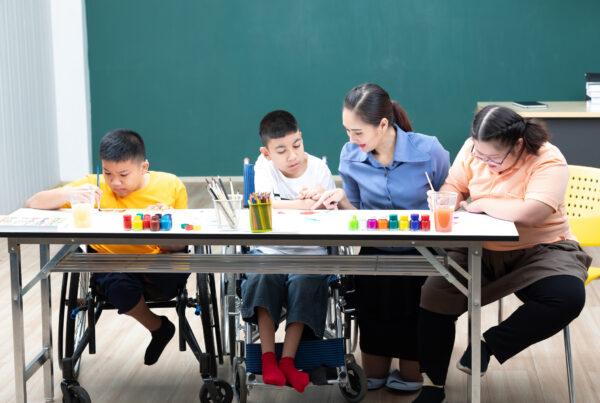
Traditional classrooms often struggle to meet the unique needs of children with disabilities. These students require additional support that a typical classroom may not provide. This is where an educational assistant plays a crucial role. They work with teachers to ensure all students can fully engage in learning.
In this post, we’ll explore the role of an educational assistant, the key skills required, and how training prepares you for success.
What Does an Educational Assistant Do in Special Education?
An educational assistant in a special education setting directly supports students with a wide range of disabilities, including physical, cognitive, emotional, and learning disabilities. The role involves working closely with teachers, therapists, and other specialists to help students access the curriculum and participate in school activities.
Some of the key responsibilities of an educational assistant include:
- Classroom Support: Assisting the classroom teacher by adapting lessons, helping students with their work, and ensuring they have the necessary resources.
- Behavioural Support: Helping manage behaviour by following individualized behaviour plans and providing encouragement and positive reinforcement.
- Physical Assistance: Supporting students with mobility challenges, including helping them move around the classroom or assisting with personal care tasks.
- Communication Assistance: Helping students with speech or language difficulties by using alternative communication methods, such as sign language or communication boards.
- Emotional Support: Offering emotional encouragement and creating a safe, supportive environment where students feel comfortable expressing themselves.
Educational assistants work one-on-one or with small groups of students, often focusing on specific needs and goals outlined in the student’s Individualized Education Plan (IEP). By providing this tailored support, educational assistants ensure that students with disabilities can fully participate in the learning process.

An educational assistant in a special education setting provides tailored support
Why Is Special Education Important?
Special education ensures that all students have access to a quality education. Special education aims to meet the unique needs of students with disabilities by providing individualized instruction, accommodations, and support that help them succeed in school.
For an educational assistant, understanding the principles of special education is crucial to effectively supporting these students. By knowing about the various types of disabilities and the specific strategies used to address them, educational assistants can help create a more inclusive learning environment where every student can thrive.
How Our Educational Assistant Training Prepares You for Special Education
If you’re passionate about working in special education, educational assistant training is the essential first step. AOLCC’s Educational Assistant Training program equips you with the skills to support students across diverse educational settings, including those with special needs. Here are some key areas covered in our program:
- Special Education Support: You’ll learn how to assist students with physical or mental challenges, often thriving in regular classrooms with additional one-on-one attention. This is crucial for creating an inclusive learning environment.
- Addressing Language and Other Barriers: Our training covers how to help students navigate language barriers and other challenges in a multicultural classroom, fostering an inclusive and accepting atmosphere.
- Understanding Child Development: You’ll explore how physical growth impacts intellectual and social development, gaining insights into managing learning readiness, vision, hearing, and attention span to support students’ success.
AOLCC’s program ensures you’re ready to meet the needs of diverse learners in special education settings.

Educational assistant training will teach you to accommodate students with disabilities
Should You Become an Educational Assistant in Special Education?
If you are passionate about helping students and making a difference in their lives, special education could be a fulfilling career path. To become an educational assistant in this field, you’ll need to be patient, empathetic, and adaptable. Every student is unique and requires thoughtful and individualized support.
Working in special education can be demanding, but it is also incredibly rewarding. You’ll have the chance to reach that moment where students overcome challenges, achieve their goals, and develop confidence in their abilities—all with your help.
Are you ready to start your learning journey?
Your career awaits!
___




